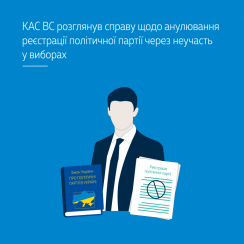Contact center of the Ukrainian Judiciary 044 207-35-46

Considering the case of a person's claim against the National Bank of Ukraine, the Grand Chamber of the Supreme Court expressed its opinion on whether the average earnings during the period of forced absenteeism can be considered a component of wages and whether the requirement to collect the average earnings during the period of forced absenteeism is covered by the provisions of part 1 of Art. 233 of the Labor Code of Ukraine on the three-month period of appeal to the court.
The plaintiff was in labour relations with the defendant and on 11 December 2017 she was dismissed from her job. In July 2019, the dismissal order was declared illegal, and the plaintiff was reinstated at work. She rested her claim on the fact that the defendant had violated the terms of payment of wages upon dismissal. The court of first instance dismissed the claim. The court of appeal partially overturned the judgment of the court of first instance and ruled to recover from the NBU average earnings for the period of forced absenteeism in favour of the plaintiff. The Civil Cassation Court within the Supreme Court referred the case to the Grand Chamber of the Supreme Court.
The SC Grand Chamber stated that the average earnings for the period of forced absenteeism provided for in part 2 of Art. 235 of the Labor Code of Ukraine and the average earnings for the period of delay in payment during the dismissal procedure defined by Art. 117 of this Code have a different legal nature.
Average earnings under part 2 of Art. 235 of the Labor Code of Ukraine, in its content, are wages, the right to which arose for an employee who was illegally deprived of the opportunity to perform his labor function for reasons independent of him, since the person is reinstated at work as of the date of dismissal, that is, it is considered that all this time he/she was in labour relations.
The dispute on the recovery of average earnings for the period of forced absenteeism, which arose in connection with the illegal dismissal of an employee who was deprived of the opportunity to perform work through no fault of his own, is a labor dispute related to non-compliance by the employer with legislation on labor and remuneration. Upon presentation of a claim for the recovery of the average earnings provided for in part 2 of Art. 235 of the Labor Code of Ukraine, plaintiffs are exempted from paying court fees in all court instances. The employee has the right to apply to the court with a claim for the recovery of average earnings without limitation by any period (part 2 of Article 233 of the Labor Code of Ukraine) and is not deprived of the right, after a court decision is made to resume him at work, subsequently to apply to the court with a claim for the recovery of average earnings during forced absenteeism in his favour (part 2 of Article 235 of the Labor Code of Ukraine).
Average earnings under Art. 117 of the Labor Code of Ukraine, by its legal nature, are a special type of employer's liability, which is charged in the amount of average earnings and is aimed at protecting the rights of laid-off workers upon receipt by them of remuneration for the work done within the period prescribed by law (all payments to which employees are entitled under the terms of the employment contract and in accordance with state guarantees) and is a kind of sanction for the employer's culpable actions in violation of the labor rights of the employee. Average earnings for the period of delay in payment during the dismissal procedure are not included in the wage structure.
The SC Grand Chamber departed from the findings of the joint chamber of the Civil Cassation Court within the Supreme Court set out in the resolution of October 10, 2019, in the case No. 369/10046/18 (proceedings No. 61-9664сво19).
Speaking on the merits of the dispute, the SC Grand Chamber reversed the decision of the court of first instance and the ruling of the court of appeal in respect of the claim for the recovery of average earnings during forced absenteeism, with the adoption of a new decision - on partial satisfaction of the specified requirement and ruled to recover the average earnings for the period of forced absenteeism.
The Resolution of the Grand Chamber of the Supreme Court of February 08, 2022, in case No. 755/12623/19 (proceedings No. 14-47цс21) – https://reyestr.court.gov.ua/Review/103893132.
This and other legal positions of the Supreme Court can be found in the Database of Legal Positions of the Supreme Court - lpd.court.gov.ua/login.